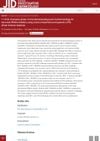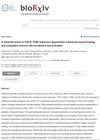 223 citations,
September 2018 in “Rheumatology”
223 citations,
September 2018 in “Rheumatology” JAK inhibitors are effective in treating various immune-related diseases, not just rheumatoid arthritis.
195 citations,
December 2009 in “Journal of Investigative Dermatology” Free fatty acids in sebum boost skin's defense against acne by increasing antimicrobial peptides.
96 citations,
December 2018 in “Immunity” Targeting TGFβ can improve skin immunity in older people.
88 citations,
May 2020 in “Clinical therapeutics” Stress can worsen skin diseases by affecting immune cells, hormones, and neurotransmitters in the skin.
 33 citations,
April 2011 in “Journal of Veterinary Internal Medicine”
33 citations,
April 2011 in “Journal of Veterinary Internal Medicine” Long-term fluticasone treatment does not harm the immune system in horses with heaves.
28 citations,
June 2021 in “Frontiers in immunology” A protein called lfTSLP is important in causing allergic and other skin diseases and could be a target for treatment.
 21 citations,
January 2021 in “Therapeutic Advances in Endocrinology and Metabolism”
21 citations,
January 2021 in “Therapeutic Advances in Endocrinology and Metabolism” Testosterone may have a dual role in COVID-19, potentially worsening outcomes in men, and testosterone therapy could help some patients, but more research is needed.
 20 citations,
November 2019 in “Current Opinion in Systems Biology”
20 citations,
November 2019 in “Current Opinion in Systems Biology” The document concludes that computational models are useful for understanding immune responses and could improve cancer immunotherapy.
 16 citations,
September 2020 in “British journal of dermatology/British journal of dermatology, Supplement”
16 citations,
September 2020 in “British journal of dermatology/British journal of dermatology, Supplement” The article suggests that targeting specific immune pathways could help control and treat the skin disease hidradenitis suppurativa.
 9 citations,
November 2011 in “Cytokine”
9 citations,
November 2011 in “Cytokine” Finasteride helps reduce lung inflammation and damage after trauma and infection.
 5 citations,
January 2021 in “Inflammatory Bowel Diseases”
5 citations,
January 2021 in “Inflammatory Bowel Diseases” Tofacitinib improved ulcerative colitis, skin ulcers, and hair loss in a patient who didn't respond well to other treatments.
 June 2024 in “Research Square (Research Square)”
June 2024 in “Research Square (Research Square)” Jagged-1 in skin Tregs is crucial for timely wound healing by recruiting specific immune cells.
Proper nutrition and vitamins can boost the immune system and overall health in older adults.
 December 2022 in “Medical lasers”
December 2022 in “Medical lasers” Low-level laser therapy may help with hair regrowth in alopecia areata but its effectiveness for psoriasis and atopic dermatitis needs more research.
September 2017 in “The journal of investigative dermatology/Journal of investigative dermatology” EGFR inhibitors cause skin issues and hair loss by weakening skin defenses, suggesting antibiotics and targeted treatments can help.
 39 citations,
January 2015 in “International journal for parasitology/International Journal for Parasitology”
39 citations,
January 2015 in “International journal for parasitology/International Journal for Parasitology” Epidermal keratinocytes start wound healing and inflammation after schistosome infection.
22 citations,
January 2012 in “Mediators of inflammation” Nonantibiotic macrolides show promise for treating various inflammatory skin conditions.
21 citations,
June 2011 in “Investigative Ophthalmology & Visual Science” Hair follicles could help develop eye treatments by studying immune responses.
14 citations,
March 2017 in “Genes and immunity” Certain microRNAs may help treat alopecia areata by targeting immune pathways.
 9 citations,
December 2022 in “Antibiotics”
9 citations,
December 2022 in “Antibiotics” Coconut seed extract may effectively treat scabies in rabbits by killing mites and reducing inflammation.
 April 2023 in “Journal of Investigative Dermatology”
April 2023 in “Journal of Investigative Dermatology” Two new IRAK4-inhibitors effectively reduced skin inflammation and immune response markers in healthy volunteers.
 September 2022 in “bioRxiv (Cold Spring Harbor Laboratory)”
September 2022 in “bioRxiv (Cold Spring Harbor Laboratory)” A parasite-derived molecule speeds up skin healing and affects immune cell behavior without increasing scarring.
Different types of sun exposure can damage skin cells and affect healing, with chronic exposure being more harmful, and certain immune cells help in the repair process.
 April 2021 in “Journal of Investigative Dermatology”
April 2021 in “Journal of Investigative Dermatology” The new skin-targeted COVID-19 vaccine creates strong immune responses and could improve vaccination methods.
 January 2021 in “Anais do Congresso Brasileiro de Reumatologia 2020”
January 2021 in “Anais do Congresso Brasileiro de Reumatologia 2020” Tofacitinib improved arthritis and partially improved hair loss in a lupus patient without side effects.
 7 citations,
October 2000 in “Allergo Journal”
7 citations,
October 2000 in “Allergo Journal” Stress may affect hair growth by influencing hair follicle development and could contribute to hair loss.
 July 2022 in “The journal of investigative dermatology/Journal of investigative dermatology”
July 2022 in “The journal of investigative dermatology/Journal of investigative dermatology” A patient with a PLEC mutation has epidermolysis bullosa, muscular dystrophy, and myasthenia gravis, which improved with steroid treatment.
 252 citations,
April 2009 in “Seminars in Cell & Developmental Biology”
252 citations,
April 2009 in “Seminars in Cell & Developmental Biology” The immune system plays a key role in tissue repair, affecting both healing quality and regenerative ability.
 191 citations,
May 2018 in “British journal of dermatology/British journal of dermatology, Supplement”
191 citations,
May 2018 in “British journal of dermatology/British journal of dermatology, Supplement” Alopecia areata is likely an autoimmune disease with unclear triggers, involving various immune cells and molecules, and currently has no cure.
 188 citations,
March 2018 in “Frontiers in Immunology”
188 citations,
March 2018 in “Frontiers in Immunology” Regulatory T-cells are important for healing and regenerating tissues in various organs by controlling immune responses and aiding stem cells.




















